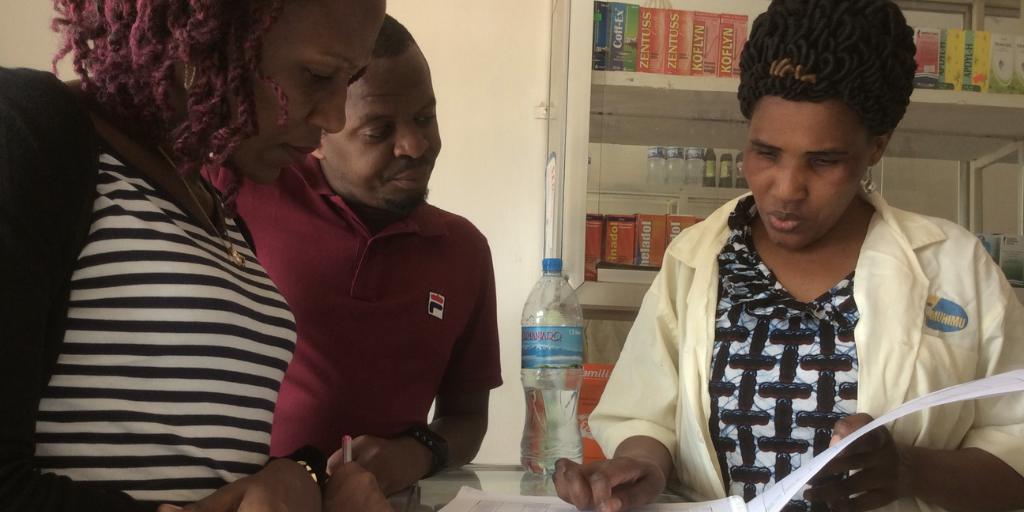Adapting to distance: using WhatsApp to train women health business owners during the COVID-19 lockdown
In many countries and communities around the world, business success is no simple achievement for women. In every sector, female business leaders face challenges that their male counterparts do not. Women in business are excluded from professional networks, underserved by banks and financial institutions, and subject to bias and discouragement, including from unsupportive spouses.

While the challenges are no different for women business owners and managers in the private health sector, the consequences often are. Throughout the world, women generally prefer to receive health care from another woman. Obstacles to the success of women leaders in health businesses create obstacles to effective care for women. Assisting women owners and managers to overcome these challenges not only supports women’s entrepreneurship, but also furthers the emergence of a more equitable and responsive health system.
In February 2020, SHOPS Plus conducted a gender analysis focused on the constraints affecting women owners and managers of health businesses in Tanzania as part of the United States Agency for International Development (USAID)-funded Sustaining Health Outcomes through the Private Sector (SHOPS) Plus project. The activity aimed to support the financial success of private health businesses; the findings from the gender analysis were used to inform a training that would address major constraints affecting women-owned health businesses.
SHOPS Plus set several priorities for this activity, in addition to delivering a high-quality training. The team wanted to co-create the training with a strong local partner to increase the chances of continuation and sustainability after the project ends. The team also placed high importance on cost-effectiveness, consistent with the USAID Journey to Self-Reliance focus on expanding the impact of every donor dollar. Finally, Tanzania experienced its first confirmed case of COVID-19 on March 16, requiring this and all development activities to accommodate restrictions on movement and gatherings.
 SHOPS Plus had already been investigating popular digital platforms, such as WhatsApp, for their potential to improve cost-effectiveness. With the arrival of COVID-19, this free platform, widely used in Tanzania, became even more attractive. The team identified a local partner with an existing network of women-owned and managed health businesses that was interested in both the subject matter and the WhatsApp delivery format.
SHOPS Plus had already been investigating popular digital platforms, such as WhatsApp, for their potential to improve cost-effectiveness. With the arrival of COVID-19, this free platform, widely used in Tanzania, became even more attractive. The team identified a local partner with an existing network of women-owned and managed health businesses that was interested in both the subject matter and the WhatsApp delivery format.
Working closely with our partner, the SHOPS Plus team conducted a structured review of the technical evidence base regarding training delivery through WhatsApp and translated findings from the gender analysis into a training plan. The resulting curriculum began with a clear group affinity among the participants (all women leaders of health businesses), collective discussion and buy-in on the goals of the training, and by-laws establishing rules around civil interaction, confidentiality, and participation. The content was structured into guidance, tools, and resources that could be transmitted over WhatsApp through audio and text messages, supported by facilitated chats and question and answer sessions. The team asked subject matter experts, such as an executive from a local bank, to deliver chats on specific topics.
The initial iteration of the training was launched with a handful of enthusiastic participants and strong engagement from the sustainability partner. Several participants testified to the value of the content, with particular appreciation for the discussions around securing a bank loan, and requested that this training be made permanent. Our partner was also pleased. “The training was very useful to women due to the challenges they face in progressing their businesses,” commented one of the co-moderators. While the positive commentary is affirming, the most enduring benefit of this experience is likely to be the strategic learning about using WhatsApp. The training generated valuable lessons related to engaging participants, sequencing and pacing content delivery, stimulating rapport, and securing trust and confidence. Future iterations of the training will incorporate this learning, ensuring that our approach to delivering training through WhatsApp, and other digital platforms, continues to improve. SHOPS Plus expects to replicate the training in the next quarter with a second of network of women-owned and managed health businesses.
Women in the private health sector face a variety of challenges, and the effect of COVID-19 on this sector and on broader communities does not make the situation any easier. By designing a training for these women, and delivering the training through WhatsApp, SHOPS Plus is contributing to the broader evidence base regarding cost-effective and sustainable strategies to support their success, even in these challenging times. And that success is good not only for the women and their enterprises, but also for the communities they serve.